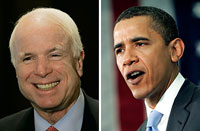McCain vs. Obama: Issueless Publicity Contest
John Fleming

(The quoted phrase is that of political scientist Michael Parenti.) There is not much essential difference between the Democratic and Republican parties; they are both status quo; they are both swayed by the corporate lobby; they are both committed to a large military; they are both anticommunist and very sensitive to “subversive activities”; they both support government-assured profit; and finally, they, in effect, guarantee the continuation of the opposite party as their primary adversary.
This leaves little to debate except social issues (abortion, gun control, etc.) and character. Hence, American campaigning lies in a fog of appearances, including the propriety of “negative attacks.” And the corporate-censored media do little to stimulate debate. The result is so much hot air, like a barking little dog that has no bite. This is not to say that there are no differences between Republicans and Democrats or that elections are never contentious. Obviously, the respective candidates want to win a seat in Congress, the governorship, and so forth. Defeat means either trying again in a few years or going back to private legal practice (most American politicians are lawyers), or both. The winner enjoys a position of power. Both candidates—whether or not you can say “of course”—wrap themselves in the flag.
The American constitution sets basic requirements for office but says little or nothing about political parties. Democrats and Republicans have monopolized power by setting standards in state laws. These, for example, make it almost impossible for a third-party candidate to even get on the ballot, and the media would ignore him anyway in a case of foregone conclusion. If a Democrat happens to turn radical in office, his district can be gerrymandered out of existence using state laws. The corporate-controlled media are supposedly set free by the “freedom of the press” purportedly guaranteed by the Bill of Rights. However, NBC is owned by General Electric, The New York Times by another corporation and so forth for all the television stations, networks and print media. Despite a continuous stream of propaganda from these media, they claim to objective and unbiased! Yet there is not a single radical on all of American television.
Stumping for president is basically portrayed in polls and analyses of whom appears to be winning. Both candidates exchange criticism in a “fog of plausibility,” as one historian put it. As sociologist Ian Robertson observed, the American proletariat has no political party to represent it; this is one reason for low voter turn out, along with the similarity of “both” parties. Voter apathy is widespread in the U.S., just as the franchise is not liberating unless organized. The closest thing to the party of the common man is the Democratic, and one sees how low the voting is of Democrats.
Although the election of Obama as the first African-American president would hardly be tokenism, nevertheless he probably would not bring change. He would have been unable to win the Democratic nomination if he were genuinely committed to change. He is not cynical, he just rather has a different concept of “change.” McCain also aligns himself with change, perhaps because the majority of Americans are have-nots opposed to the status quo and to interminable polls and shallow examinations of whom seems more popular.
John Fleming is the author of Word Power: A Dictionary
of Fascinating and Learned Words and Phrases for
Vocabulary Enrichment
This book may be ordered by phoning in the U.S. 1-800-462-6420
Subscribe to Pravda.Ru Telegram channel, Facebook, RSS!





